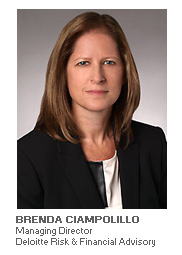
According to a recent Deloitte poll, nearly half of M&A professionals say they are likely to pursue a divestiture in the coming 12 months, and among those contemplating divestitures, roughly 40 percent of those polled say their organizations are likely to pursue 1 to 2 divestitures in the year ahead, while 7.5 percent say their organization may pursue as many as 3 to 4.
To gain and understanding of what is driving this shift in posture and its impact on both buyers and sellers in the market, ABL Advisor met with Brenda Ciampolillo, Managing Director, and David Oberst, Partner, both with Deloitte Risk & Financial Advisory.
ABL Advisor: According to a recent Deloitte poll, nearly half of M&A professionals say they are likely to pursue a divestiture in the coming 12 months with more than half saying their organizations are most likely to purse a sell-off of a business unit or company to another organization. Please provide our readers with a general sense of why M&A professionals are taking this stance.

Brenda Ciampolillo: We are seeing companies looking to divest non-core assets right now as a way to raise cash based upon some of the dynamics going on from a market and economic perspective. They are looking to concentrate more on the core components of their business to streamline operations and also look for ways to increase shareholder value. This is leading more to complete selloffs of components of businesses versus some of the other activity we've seen in the past.
David Oberst: I would also add that when you think about the M&A boom during the pandemic, everyone was gobbling up assets, and now the market has slowed a bit and it's given many companies time to take a step back and reassess their portfolios. Maybe they bought a bunch of different assets, and it changed their own trajectory as a business and some of their historical business units no longer fit within their strategy. I think it's been a reflective time for many companies as they have been able to take a break from the M&A boom that occurred during the pandemic.
ABL Advisor: Can you recall a time when M&A activity was as strong as it was during and after the pandemic?
Ciampolillo:We saw the boom during the pandemic for many different reasons lasting until almost the end of the pandemic. We saw some market conditions fluctuate and change, and then the boom slowed while people were in some ways re-leveling, and the market was in some ways trying to figure out where it was headed. In 2008 and 2009, we saw a lot of these economic uncertainties cause activity to completely halt.

Oberst: The numbers would say that the period of 2021 was the highest M&A market in the history of M&A. And so, from a broad perspective, no, we've never seen anything like that. We have certainly seen very busy M&A periods such as during 2004, 2005 and 2006 – those were very busy years. In my opinion, one of the key differences between what we saw recently versus that time is the proliferation of private equity and the amount of capital that was in the market to be deployed. There was a tremendous amount of capital deployed with people very interested in doing deals and it was kind of a perfect storm, if you will, to drive very strong M&A activity during the pandemic.
ABL Advisor: Are there any sectors in which you are seeing a greater likelihood of divestitures in the coming year?
Ciampolillo: I would say it's consistent at the moment from my perspective.
Oberst: If we look at it from our pipeline and from client feedback, it really is across the industry spectrum. I would not say there's any one sector or industry more dominant or more happening at a higher rate than the other.
ABL Advisor: Current market conditions, including rising interest rates, are driving down interest in IPOs and making the outright sale of underperforming or non-strategic assets paramount for the operational health of many organizations. Please expand on what you are seeing in the market in terms of these divestitures of such assets.
Oberst: I believe many companies are rethinking their strategy – thinking about what's core to their businesses. A few trends that we are seeing include that the timelines are being extended from when companies are starting to think about selling an asset to when they actually bring it to market. There's a lot more advanced planning, even from when a business goes to market to when a deal gets signed. That timeline is extending. Buyers are conducting more thorough due diligence than they were during the pandemic. We are also seeing the return of in-person management meetings on the diligence side and people actually getting together, which is great. I believe there's been more of a personal touch to due diligence, which is something we experienced for every period up until the pandemic. There is also an emphasis on cash flow. I think buyers and financiers are particularly interested in cash flow in this rising interest rate environment. Therefore, I believe there is more focus on financial due diligence and certain areas are getting a bit more scrutiny than they had been getting in the few years prior.
Ciampolillo: I agree. On a few of the transactions I'm working on right now, you can definitely see an increased level of diligence coming from buyers, much more intense questions than we saw during the pandemic, which we said previously might have been a little bit of an unusual state where diligence was running hard and fast during COVID. During that time, transactions were happening very quickly, and now people are taking that step back and being more thoughtful about the diligence they are conducting, asking more deep dive questions to make sure that they are paying the right value for a company and understanding what they are actually buying.
ABL Advisor: Borrowing costs have gone up over the past year, yet in many cases, valuations have yet to come down. What is causing this dynamic, and how is this impacting buyers’ diligence requirements to justify paying a perceived premium on assets? Also, are sellers prepared to meet these buyer requirements?
Ciampolillo: I think that may vary across different potential sellers. We are telling our sellers now that it is even more important today to be a prepared seller than maybe it was during the pandemic because you are going to get that level of scrutiny. You do need to be extra prepared. Not that you didn't need to be prepared during the pandemic, but it seemed like most sellers I’m working with at this time are listening and understanding that they need to be better at understanding where the potential deal issues might be – being prepared to answer diligence questions and to know that the process may take a little longer than they originally thought.
Oberst: I agree. I think word is starting to get out on the street and people are expecting it. They are starting to build on that expectation. They are probably getting that information from their banking advisors that from a timeline perspective, they need to be prepared and expect that it is going to take a bit longer than it had in previous years.
ABL Advisor: Are asset valuations today being scrutinized that much more tightly than they were over the past two or three years and is this scrutiny driving the level of diligence required on the actual asset valuation?
Ciampolillo: I believe that what is driving the increase in diligence is making sure that the valuations are correct, and they are not overpaying for assets. This is part of the reason we are seeing an increased level of due diligence from buyers. There was a bit of a slowdown in the marketplace for some of these deals, and while the valuations didn't come down quite as fast as people were thinking they would, they did stay flat for a while. I think it's making sure that you are paying the right value.
Oberst: I think that's right. Asset valuation leads directly into the amount of debt that might be taken out to finance a deal and how much cash flow is needed to service that debt. I think it's all part of the same thing – where companies and buyers just want to be more focused on cash flows and make sure they are paying the right price, given that it's more expensive to borrow these days.
ABL Advisor: What does the report indicate in terms of parent company dissolutions or de-mergers as compared to divestitures?
Ciampolillo: I am seeing companies strategically talking about potential IPOs in the future. Nothing in the near term, but obviously people are still strategically, as David mentioned earlier, taking a hard look at what their portfolios do have, and maybe they are thinking about how to be prepared in the future if the right timing is presented. In terms of doing a de-merger or an IPO in the future, I just don't think that will happen in the near term at all for the most part with our clients. It's not top of mind for them. Full sales are definitely more top of mind.
Oberst: I think that is correct. I think from an IPO perspective, we are getting more people interested in starting to talk about a timeline and a roadmap. Therefore, I think potentially within the next six to 12 months, some of that activity will pick up where it's been slow over the last six months.
ABL Advisor: What was the primary takeaway for each of you when you read the results of the survey?
Ciampolillo: For me it was the whole concept of people accepting or realizing that there is going to be an increase in diligence. They do need to be better at being a prepared seller. There's just more of a buy-in to those factors that we know are coming.
Oberst: The thing that jumped out to me was that this was a very wide group of business professionals across a lot of companies and industries. To have over 50 percent say that their business is considering a divesture over the next 12 months is a very high number. So that really spoke to me about the fact that we're going to see a wave of these. Divestitures have a long runway, and this poll was five months ago. We have yet to see the biggest piece of this. I think it's still yet to come.